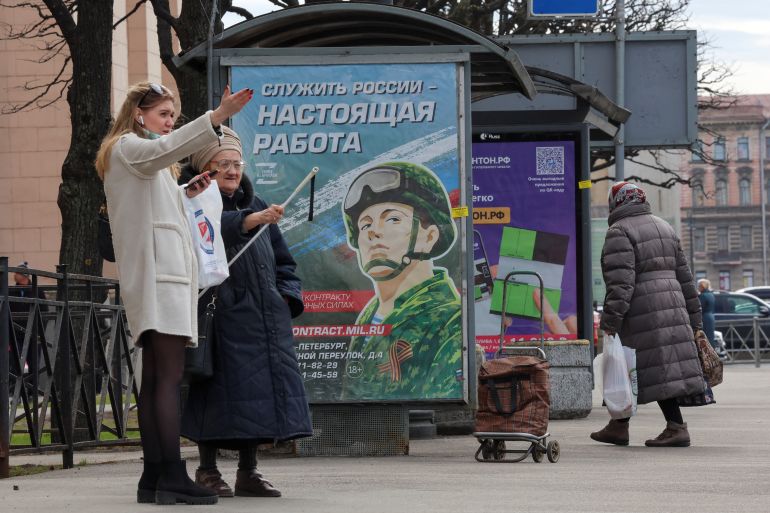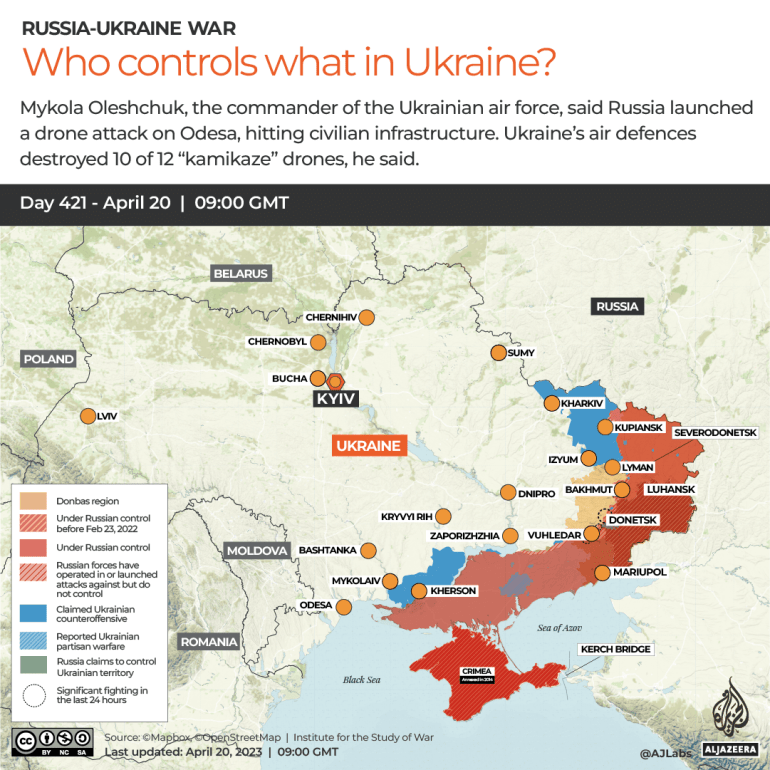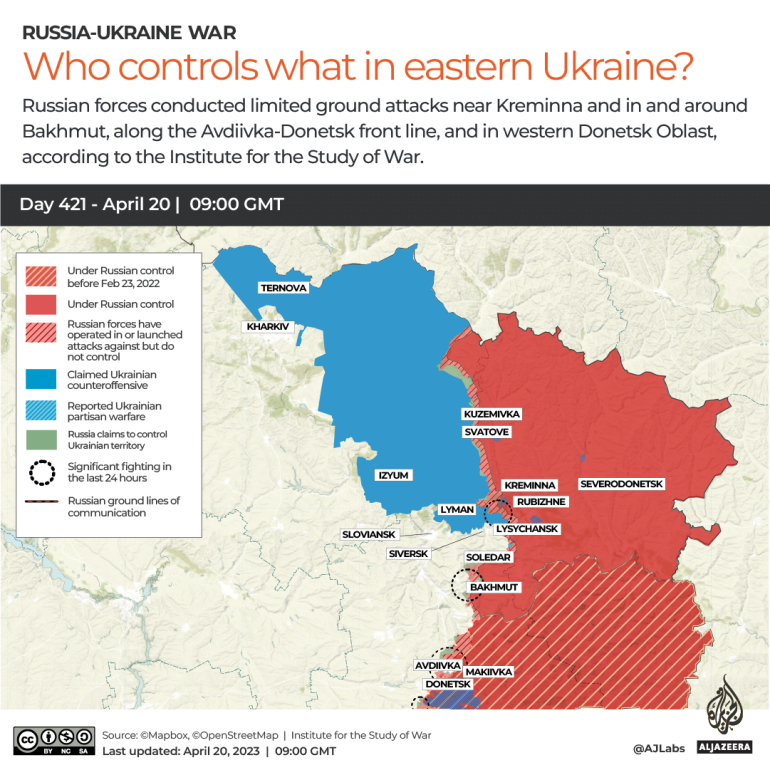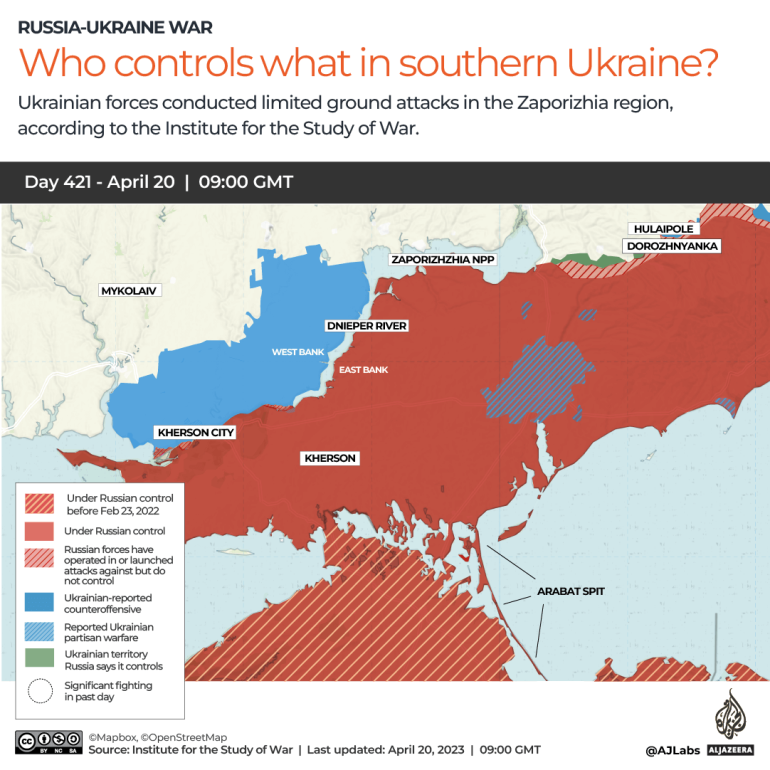Ukrainian counteroffensive looms as Putin leans on Wagner
What happened in the 60th week of Russia’s war on Ukraine?

Ukrainian forces refused to surrender Bakhmut over Orthodox Easter despite ceding yet more territory to advancing Russian forces during the 60th week of the war.
Kyiv continued to gather war materiel for a counteroffensive, and power shifts in the Russian military suggested that President Vladimir Putin was displeased with his army’s performance during a winter offensive, which failed to capture the remaining areas of Luhansk and Donetsk not under Russian control by March 31.
Keep reading
list of 3 itemsAbsolut vodka suspends exports to Russia
Ukrainians and Syrians must stand united against Putin’s Russia
Ukraine’s military said “bloody battles unprecedented in recent decades” were being fought in the eastern city of Bakhmut, which has been levelled by months of fighting.
Geolocated footage published on Monday suggested Wagner units had advanced in the northwestern part of the city. The Russian Ministry of Defence said it had captured three city blocks in the north, south and central areas of the city.
Colonel Dmytro Zovorotnyuk, who commands a Ukrainian battalion in Bakhmut called the Teronoron Force, said his troops were facing tactics unusual for Russian forces.
“The Russians attack mainly in small groups of five to six people who, under the cover of artillery, try to penetrate the battle formations of the Defence Forces of Ukraine and engage in close-range shooting battles,” he said.
This was unlike the broad frontal attacks the Russians attempted in the early months of the war.
Moscow said its paratroopers had succeeded in blockading the embattled city, so Ukrainian forces could not get in or out.
“Airborne troops are … blocking the transfer of Ukrainian army reserves to the city and the possibility of retreat for enemy units,” the defence ministry said in a statement.
Both sides claimed the battle was causing greater attrition for the other side.
“During the last two weeks in the Bakhmut area, the enemy lost almost 4,500 ‘Wagnerians’ and servicemen of the regular armed forces of the Russian Federation killed and wounded,” said Brigadier General Oleksiy Gromov of the Ukrainian General Staff.
Deputy Defence Minister Hanna Maliar said on Facebook: “Enemy losses in Bakhmut are many times higher. There are days when the difference reaches 10 times.”
Ukraine has estimated about 100 Russian fatalities a day in Bakhmut and about as many wounded. But the head of the Wagner Group mercenary force said Russia had the advantage.
“Bakhmut is extremely beneficial for us,” Yevgeny Prigozhin wrote in a 3,000-word essay. “We grind the Ukrainian army there and restrain their manoeuvres.”
He admitted what Ukraine has argued, that the battle was strategically pointless for Russia.
“The capture of Bakhmut itself will not ensure a short-term victory over Ukraine, the road to the Dnieper [River] or even the capture of Donbas,” he said.
Putin leans on Wagner to win war
Putin appeared to bring Wagner back into the centre of his strategy in Ukraine after his military leadership tried to starve it of ammunition during the winter.
“Wagner forces appear to be receiving reinforcements, ammunition, and political recognition – which is a stark deviation from the Kremlin’s previous efforts to expend Wagner forces and Prigozhin in Bakhmut since at least January 2023,” said the Institute for the Study of War, a Washington-based think tank.
“Wagner-affiliated sources announced on April 17 that Wagner is training up to three motorized rifle brigades of mobilized personnel to reinforce Wagner‘s flanks in Bakhmut,” the institute said.
Ukraine’s eastern forces spokesman Serhii Cherevaty confirmed the collaboration between paratroopers and Wagner mercenaries.
“The main striking force of the enemy remains the mercenaries from the Wagner armed forces group, who are driven to attack under the threat of being shot,” Cherevaty said. “At the same time, due to heavy losses, the leadership of this terrorist company is forced to add regular airborne units of the Russian armed forces to their formations for support, which we are also successfully destroying.”
Prigozhin confirmed this collaboration too.
The European Union last week introduced sanctions against Wagner as a vital part of the Russian war effort.
It said Wagner “spearheaded” the attacks on Soledar, an eastern town that fell on January 12, and in Bakhmut, and “is therefore responsible for supporting materially actions which undermine and threaten the territorial integrity, sovereignty and independence of Ukraine”.
The EU also sanctioned RIA Fan, which it described as a Prigozhin-controlled propaganda outlet.
Putin’s favour towards Wagner suggested his displeasure towards his defence minister, Sergei Shoigu, and his commander of the armed forces, Valery Gerasimov, who attempted to starve Wagner of ammunition and conscripts during the winter.
That displeasure was likely due to Shoigu’s and Gerasimov’s failure to capture the remaining areas not under Russian control in the eastern regions of Luhansk and Donetsk by the end of March, as Putin had requested.
But Putin’s closer affiliation with Wagner could also put him in legal trouble.
New evidence against Wagner emerges as lawsuits await
Al Jazeera previously reported on civil lawsuits under way that lawyers who brought them said aim to prove Wagner is a “terrorist” organisation.
New evidence has come to light strengthening those court cases.
On Monday, Russian human rights organisation Gulagu.net released a video interview with two former prison convicts who were released after enlisting with Wagner.
Azamat Yaldarov admitted that Prigozhin ordered his unit to kill children while taking control of Soledar and that he had killed 18 children in Krasnodar Krai and Saratov and Kirov provinces.
Aleksey Savich said Wagner gave the order to kill all civilians in Bakhmut aged 15 and older and that his unit killed 23 civilians, 10 of whom were unarmed teenagers.
Savich also said he witnessed the executions of 80 Wagner fighters for refusing to follow orders and he fired on his own men for the same reason.

These testimonies reinforce existing evidence suggesting that Wagner has killed gratuitously and committed crimes against humanity.
Putin’s increasingly undisguised dependence on the group to achieve state aims could embroil him in further legal trouble.
On March 17, Putin became the first head of state indicted by the International Criminal Court. The indictment was “for the war crime of unlawful deportation of population (children)” to Russia.
Ukraine adds to its arsenals
Ukraine continued to assemble equipment and train fighters for its counteroffensive.
Its military intelligence said it had fielded its first Black Hawk helicopter in combat and sought more.
Canada said it was going to begin transferring confiscated Russian assets to Ukraine with an Antonov-124 Ruslan transport aircraft. It had also dispatched all eight Leopard 2 tanks it had promised to Ukraine.
Britain presented Ukraine with a company of 14 Challenger-2 battle tanks.
Germany on April 13 gave Poland permission to send its MiG-29 fighter jets to Ukraine. Poland bought 22 MiG-29s from Germany after the fall of communism, and Berlin had to approve the change of end user.
Poland has sent four MiG-29s, plans to send another four soon and is preparing another six.
Slovakia had sent all 13 of its MiG-29s to Ukraine, but Ukrainian air force spokesman Yuriy Ignat said not all were usable in combat. Only four were flown to Ukraine. Nine travelled by road. Ignat said some Slovak MiGs would be cannibalised for spare parts.
Meanwhile, Prigozhin said Ukraine had 200,000 troops in the field and enough equipment to send them on the offensive “in various directions”, he said.
But, he warned, “if the armed forces of Ukraine do not go on the offensive in the near future, they will gradually begin to lose their combat potential.”
Prigozhin said he believed the Ukrainian counteroffensive, when it came, could succeed.